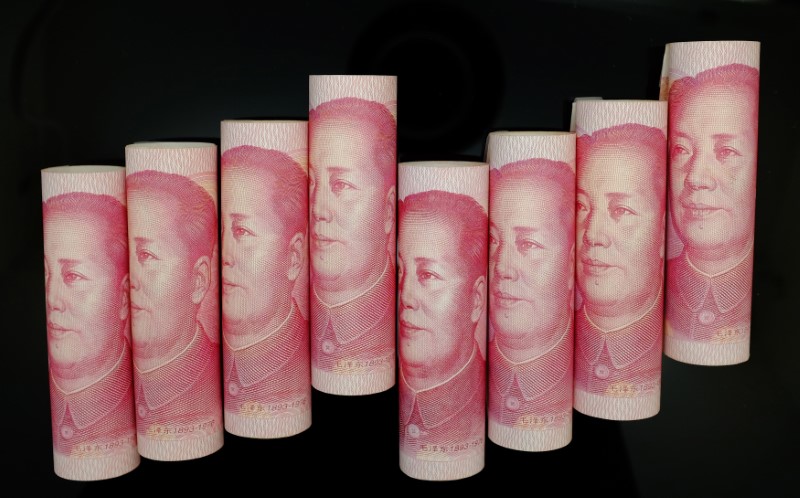By Saikat Chatterjee
HONG KONG (Reuters) - While Beijing has been busily damming up official channels for money to leave China, more than ever is leaking out through shady means as investors flee the country's slowing economy and weakening currency.
China's official foreign exchange reserves fell more than half a trillion dollars last year and are still falling, with a loss of nearly $46 billion in October alone, and the International Institute of Finance think-tank estimates outflows doubled in the September quarter to more than $200 billion.
To stem the flows, Beijing has frozen or restricted its main schemes allowing wealthy individuals (QDLP) and financial institutions (QDII) to invest overseas, and lawyers have noted a sharp slowdown in the approval process for large overseas direct investment (ODI) deals.
“Fresh new QDII quotas have been broadly halted, ODI investments involving large amounts of foreign exchange remittance are taken on a case-by-case basis, and the QDLP scheme is undergoing a slowdown,” said Yin Ge, counsel and head of financial services practice at Clifford Chance in Shanghai.
Industry executives say there is no likelihood of any thaw in the coming months, so investors are seeking other means to get their cash out, such as faking trade transactions through Hong Kong.
“The growth in the sheer volume of such transactions going through such channels means that even though more suspicious transactions are being caught by financial institutions, they represent a tiny fraction of the overall volumes of fake trade invoicing,” said Alicia Garcia Herrero, chief economist at Natixis in Hong Kong.
SKIRTING RESTRICTIONS
Official efforts to curb outflows have been extensive.
Two executives at separate fund management companies in Hong Kong said the QDLP program, halted since March this year, is likely to stay that way until mid 2017, according to briefings with government officials.
For cross-border transactions above $50 million, government officials are demanding personal visits from investors to the offices of the State Administration of Foreign Exchange, the country's forex regulator, or asking them to pay by installments.
And they are bearing fruit.
Outbound Chinese mergers and acquisitions in the September quarter have fallen by more than half to $38.4 billion from the March quarter, according to Thomson Reuters data, and from $42.5 billion in the June quarter.
Investment-linked insurance products, some offering returns of 6-7 percent, became an attractive alternative, with mainlanders accounting for more than half of AIA's annualized new premiums in Hong Kong, and similar figures for rival Prudential (LON:PRU).
But Beijing is also clamping down on that avenue, with China's biggest bank card provider UnionPay tightening regulations last month over how mainland customers can use its debit and credit cards to buy insurance products in Hong Kong.
But one insurance industry executive said people were still finding a way to skirt the restrictions.
“People will do what they need to do," he said. "Water flows through different places.”
TRADE CHANNELS
Jolyon Ellwood Russell, partner at lawyers Simmons & Simmons, said international anti-money-laundering monitor Financial Action Task Force (FATF) had identified four main channels to bring money out of China: cash smuggling in vans, finance channels, trade and shadow banking.
"The recent yuan weakness has meant that they are being used heavily,” he said.
With finance channels closing, fake trade invoicing has grown - as demonstrated by a growing gap between figures for Chinese imports from Hong Kong and Hong Kong's exports to China, which ought to be equal and opposite.
In essence, Chinese importers overpay for goods from Hong Kong, the buyer declaring a larger figure to Chinese authorities than the seller declares in Hong Kong, with the difference parked in an offshore bank account.
A three-month moving average to end-September shows the unexplained gap represents a staggering 70 percent of the total trade between the two, reaching its highest level this year of $1.4 billion, according to Thomson Reuters data.
Johnny Fang, senior analyst at Shanghai-based Z-Ben Advisors, says officials have stepped up their monitoring of cross-border trade transactions in recent months.
The Joint Financial Intelligence Unit, an outfit comprising police and customs officials in Hong Kong, received 59,732 suspicious Transaction Reports (STRs) in the first three quarters of 2016, doubling from the same period of 2015.
This influx of Chinese cash is also causing headaches for Hong Kong authorities to handle, distorting asset prices in the city.
"(It) explains the out performance in Hong Kong stocks and property relative to global peers, and that is likely to continue,” said Herrero at Natixis.
